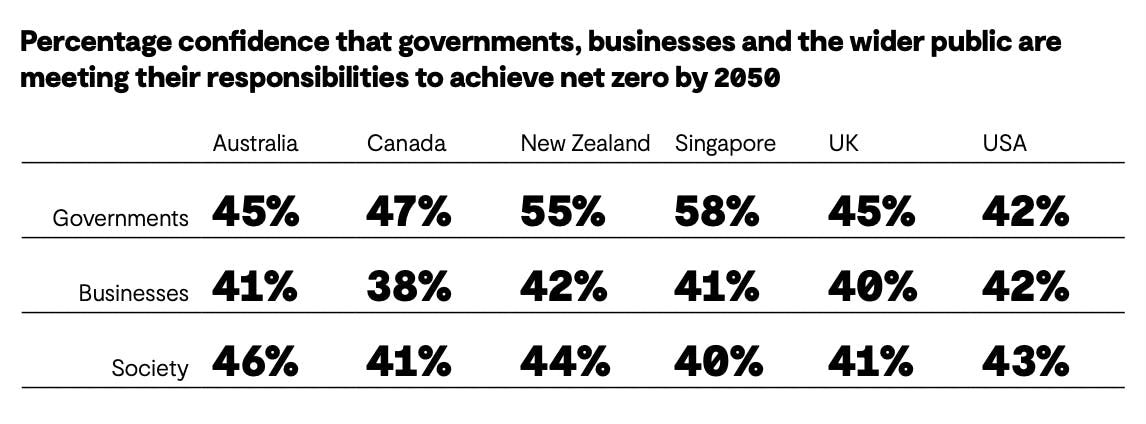The legacy of the Covid-19 pandemic will mark a substantial shift in our daily habits, according to a study by professional services firm GHD.
To continue reading, subscribe to Eco‑Business.
There's something for everyone. We offer a range of subscription plans.
- Access our stories and receive our Insights Weekly newsletter with the free EB Member plan.
- Unlock unlimited access to our content and archive with EB Circle.
- Publish your content with EB Premium.
The study surveyed more than 8,000 people in six wealthy countries to assess how changing attitudes and behaviours could affect progress towards meeting climate goals such as decarbonisation and low-carbon living.
More than a quarter of people believe their daily habits will change to a ‘great extent’, the study found. This is particularly the case in Singapore, with 86 per cent of respondents expecting a change in daily habits compared to New Zealand, on the lower end, with 68 per cent.
Both countries have jostled for the top spot in Bloomberg’s Covid resilience ranking with Singapore claiming pole position on Monday (26 April).
The pandemic is likely to have the biggest impact on our cities as more people expect to work from home more and businesses look to reduce their floorspace. An upside of this might be a “radical approach where under-utilised commercial spaces are transformed into vertical farms, reducing ‘food miles’ and improving local food security,” GHD predicts.
How we travel could be the “most visible” legacy of the pandemic, the study said, as fewer people commute the office and with air travel looking less likely in the short-term. Transport will have to be more dynamic and responsive to crisis, the report said. City governments are also likely to push for the wider uptake of electric vehicles to help drive down emissions – although most market respondents appear to have limited access to charging points and home-charging capabilities.
Curiously, Singapore residents are more likely to consider buying an electric car (49 per cent) than residents in Australia (37 per cent), Canada (46 per cent), New Zealand (43 per cent), UK (46 per cent) and US (45 per cent), but are the least confident in their country’s charging infrastructure.
Energy consumption will also be impacted, with advances in the storage of alternative energy sources to “drive a decentralised energy grid and sponsor a new model for energy utilities,” the report said. The cost of energy is a dominant concern in all six markets, according to the survey, which may play a role in driving domestic power generation from solar panels, particularly in low-income households.
Scepticism to hit net-zero targets
The Covid-19 pandemic has provided a strong case to ramp up investment and commitment to a clean energy future, but the research found that confidence in governments to meet zero-carbon targets — which refers to achieving a balance between the amount of greenhouse gas emissions produced and the amount removed from the atmosphere — was low across the five markets.

Percentage of people who think governments, business and society will meet climate goals [click to enlarge]. Source: GHD
The study found that Singapore has the highest proportion of citizens (58 per cent) who have confidence in their government to hit emissions-reduction targets. Singapore has one of the weakest climate targets of the countries surveyed.
A small city-state with an economy largely reliant on petrochemicals, Singapore does not have a timeline for achieving net-zero emissions, declaring last year that it would achieve this ambition as “soon as is viable” after 2050.
Under half of Australians have confidence in their government to hit targets. The country is the world’s largest exporter of natural gas and second-largest supplier of thermal coal and has been reluctant to make a mid-century net-zero emissions target. It was only recently in February that prime minister Scott Morrison said that the country is aiming to hit net-zero “as soon as possible, and preferably by 2050.”
The United States declared a 2050 net-zero target last week, with President Joe Biden saying it would meet carbon neutrality by “no later than 2050” and would half emissions by 2030 but environmentalists say this is still insufficient to meet the realities of the climate crisis. The country’s citizens agree and proportionately, have the least faith in its government – 42 per cent - to do their part to achieve these goals, the survey found.
GHD’s report noted that to meet climate goals such as the Paris Agreement on climate change — which aims to cap global warming to 1.5 degrees Celsius by the end of the century — there is a need to ramp up renewable energy six times faster than the current rate, transition to EVs 22 times faster, and phase out coal five times faster.





















